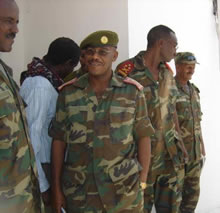
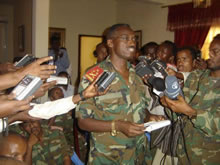
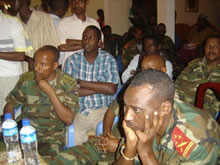

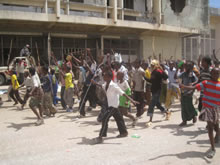
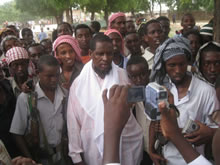
Stratfor Today
January 13, 2009 | 2104 GMT
Ethiopian troops pulled out of four bases in the Somalian capital, Mogadishu, on Jan. 13. The withdrawal occurred at bases in neighborhoods of northern Mogadishu that are trongholds of al Shabab, a hard-line Islamist
militia. Ethiopia, which has about 3,000 troops in Somalia, had announced
about six weeks ago that it intended to make such a pullback.
It also is likely to withdraw troops from its 10 other bases in Mogadishu,
though the pullback does not mean Ethiopia is abandoning the fight. Related Links
Ethiopia has maintained its intervention in Somalia since 2006 for two purposes. One was to become a key ally of the United States in trying to
block the al Qaeda-linked al Shabab from establishing Somalia as a base of
operations for al Qaeda. (This move meant Ethiopia would not only receive
U.S. material assistance, but also effectively be shielded by the United
States from criticisms of human rights violations that it was facing at the
time.) The other reason was Addis Ababa's national security imperative of
preventing Somalian Islamists, whom the Ethiopians have fought for decades, from collaborating with ethnic Somali rebels in Ethiopia to carve up
Ethiopian territory and wage insurgent attacks against the Ethiopian
government.
The Ethiopian troop pullback comes amid Addis Ababa's criticism of the
Somalian government and the international community for failing to share the
burdens and costs of its intervention in Somalia. Meanwhile, the Ethiopian
presence in Somalia has been a popular rallying cry for Islamists claiming
to be defending the country against foreign and Christian occupation.
The withdrawal from Mogadishu does not mean Ethiopia is pulling out of
Somalia, however. National security imperatives will continue to drive
Ethiopia's involvement in Somalia. Addis Ababa likely will maintain troops
in garrison towns in southern and central Somalia as a forward line of
defense and to maintain supply lines to support proxies against al Shabab.
To that end, Ethiopia has armed and provided funding for clan militias in
central Somalia, and it is likely behind the creation of the Ahlu Sunna
Waljamaca, a militia that has fought al Shabab in central Somalia and claims
to defend the interests of moderate Islamists in the country. The Ahlu Sunna
Waljamaca likely will take the fight to Mogadishu, keeping the city a
violent hive of insurgent and counterinsurgent warfare under no undisputed
control while enabling the Ethiopian withdrawal. Separately from the
Ethiopians, an African Union peacekeeping mission still provides security in
Mogadishu, though its approximately 3,000 Ugandan and Burundian troops are
unable to secure sites beyond Mogadishu's international airport and seaport
or provide personal protection to Somalian government officials.
The Ethiopian pullback from bases in Mogadishu signals that the troops are
no longer directly combating hard-line Islamists in Somalia. But the move
away from the Somalian capital is likely part of a staged withdrawal to
garrison towns in the Somalian countryside and along the Somalian-Ethiopian
border, from where the Ethiopians will support a proxy war against al
Shabab.
Source: Stratfor




